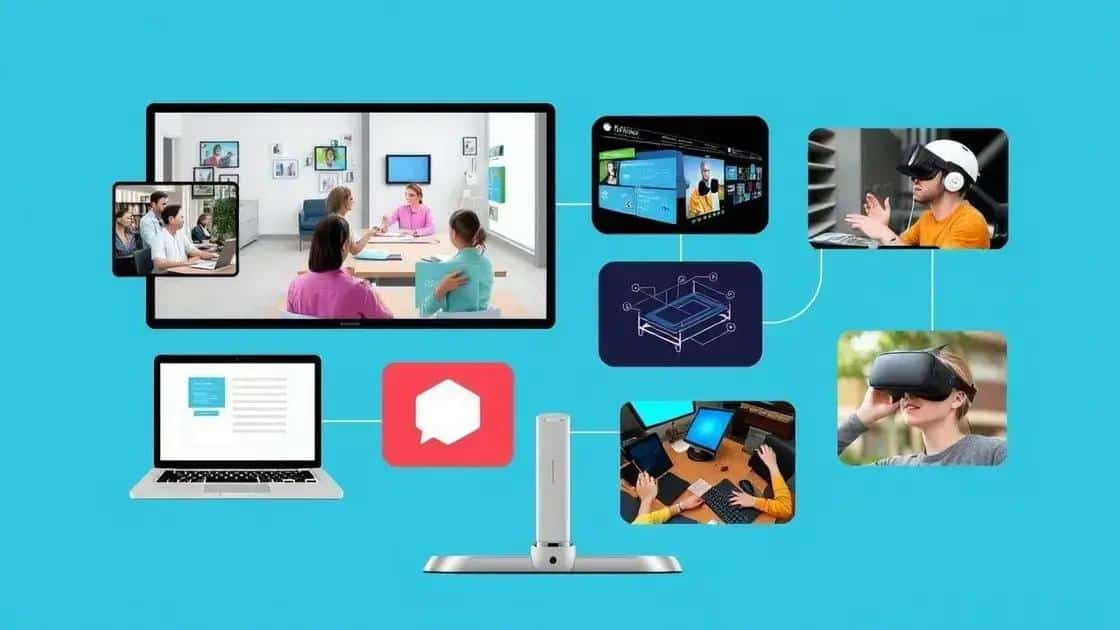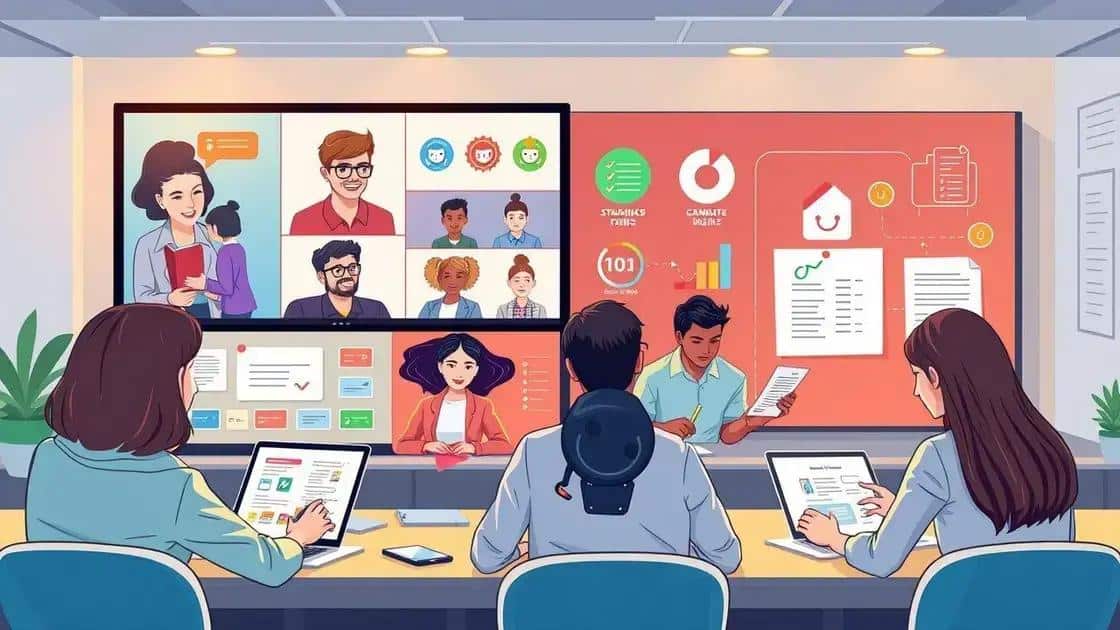Online course trends shaping the future of education

Online course engagement strategies, such as gamification and real-time feedback, actively involve students in the learning process, enhancing motivation and improving educational outcomes.
Online course trends are rapidly changing how education is delivered and consumed. With technology at the forefront, these trends not only redefine learning but also open new avenues for personal and professional growth.
Emerging online course formats
The world of **online course formats** is evolving rapidly. New trends are emerging, making learning more engaging and accessible. With advancements in technology, educators are exploring various formats to cater to different learning styles and preferences.
Popular online course formats
There are several formats gaining traction in the online education landscape. Many learners prefer interactive and multimedia-rich experiences.
- Live Webinars: These real-time online sessions encourage interaction between instructors and students.
- Video-Based Courses: Pre-recorded videos allow students to learn at their own pace, revisiting complex concepts as needed.
- Microlearning: Short, focused segments of content that help learners grasp concepts quickly.
- Hybrid Courses: A blend of online and in-person instruction, combining the best of both worlds.
Additionally, social learning elements are becoming more common. Students enjoy collaborating and sharing insights with peers. Platforms that incorporate social features, like discussion boards and group projects, enhance the learning experience.
Benefits of diverse formats
Offering various course formats benefits both educators and learners. Instructors can reach a broader audience while students enjoy the flexibility to learn in a way that suits them best. This adaptability fosters a richer educational environment.
As the landscape continues to change, staying updated on **emerging online course formats** is essential for anyone involved in education. These formats not only enhance learning but also prepare students for a world that increasingly values flexibility and innovation in education.
Key technologies driving online education

Advancements in technology are crucial for the evolution of online education. The integration of innovative tools has reshaped how courses are designed and delivered. With **key technologies** paving the way, learning becomes more interactive and accessible to students everywhere.
Essential technologies in online education
Various technologies are transforming the educational landscape. These innovations enhance engagement and facilitate a better learning experience.
- Learning Management Systems (LMS): Platforms like Moodle and Canvas streamline course management, tracking, and communication between educators and learners.
- Video Conferencing Tools: Software such as Zoom and Microsoft Teams allow for real-time collaboration, making it easier to conduct live classes and discussions.
- Artificial Intelligence: AI enhances personalization in learning by adapting content to fit individual needs and providing intelligent tutoring.
- Virtual Reality (VR): VR creates immersive learning experiences, enabling students to engage with complex subjects in a hands-on way.
These technologies not only improve the delivery of content but also foster community building among learners. For example, video conferencing strengthens connections, while discussion forums facilitate collaborative learning. As technology continues to progress, the potential applications in education expand, leading to new formats and delivery methods.
The future of educational technology
Looking ahead, the impact of **key technologies driving online education** will only intensify. Innovations like blockchain for credentialing and adaptive learning algorithms are on the horizon. These developments aim to create even more tailored educational experiences that empower learners to succeed.
By embracing these advancements, educators can provide students with a richer, more engaging learning journey that meets their unique needs and preferences.
How online courses enhance skill acquisition
Online courses are revolutionizing the way individuals acquire new skills. They provide a flexible learning environment that can adapt to different needs. By offering a variety of formats and resources, these courses make skill development accessible to everyone.
Interactive Learning Experiences
One of the main advantages of online courses is their ability to create interactive learning experiences. Engaging exercises, quizzes, and discussions keep learners motivated and focused. This engagement helps to deepen understanding and retention of the material.
- Hands-On Projects: Many courses incorporate projects that allow students to apply what they’ve learned in real-world situations.
- Peer Feedback: Interactive platforms enable learners to give and receive feedback from peers, further enhancing their skills.
- Simulation Tools: These tools provide a practical way to practice skills in a virtual environment.
- Gamification: By transforming learning tasks into games, students remain engaged and enjoy the learning process.
Flexible scheduling is another key feature of online courses. Learners can choose when and where to study, which fits better into their busy lives. This convenience allows for better time management and promotes consistent learning.
Personalized Learning Paths
Online courses often allow for personalized learning paths that cater to individual goals. This customization can enhance skill acquisition by focusing on areas that require improvement. The ability to work at one’s own pace is invaluable, especially for those balancing work and family commitments.
Moreover, many platforms offer access to a wide range of resources. From videos and textbooks to forums and expert interviews, these diverse materials can cater to varying learning styles. Students can delve deeper into topics that interest them, strengthening their skills and knowledge further.
Trends in student engagement strategies

Student engagement is vital in online education. As more learners turn to digital platforms, effective engagement strategies have become essential. By utilizing innovative approaches, educators can foster a more interactive and motivating learning environment.
Interactive Tools and Resources
Online courses often use interactive tools that enhance participation. For example, discussion forums and live polls encourage students to connect and share their thoughts. These tools make learning more dynamic and help build a sense of community among peers.
- Gamification: Incorporating game elements, like points and badges, increases motivation.
- Real-Time Feedback: Instant assessments help learners understand their progress and areas for improvement.
- Collaborative Projects: Group assignments enable students to work together, fostering teamwork and communication skills.
- Multimedia Content: Videos, podcasts, and infographics cater to various learning preferences, making the material more accessible.
Transitioning between different engagement strategies keeps the learning experience fresh. For instance, instructors can alternate between live sessions and self-paced modules to suit different learning styles. This flexibility allows students to absorb information at their own pace while still feeling part of a community.
Catering to Diverse Learning Styles
Understanding that students have different motivations and learning styles is crucial. Some may thrive in a competitive environment, while others prefer collaboration. Tailoring engagement strategies to meet these varied needs ensures that all learners feel included.
By implementing diverse strategies, educators create a richer learning experience. Techniques like personalized communication and tailored resources further enhance student engagement. The goal is to make every student feel valued and involved in their education.
FAQ – Frequently Asked Questions about Online Course Engagement Strategies
What are student engagement strategies?
Student engagement strategies are methods used by educators to actively involve students in the learning process, enhancing motivation and participation.
How can gamification improve online learning?
Gamification uses game elements like points and badges to make learning more interactive and rewarding, which can increase student motivation.
What role does real-time feedback play in online courses?
Real-time feedback provides students with immediate assessment of their understanding, helping them identify areas for improvement and stay on track.
Why is it important to cater to diverse learning styles?
Catering to diverse learning styles ensures that all students can engage effectively, making learning more inclusive and enhancing overall educational outcomes.





